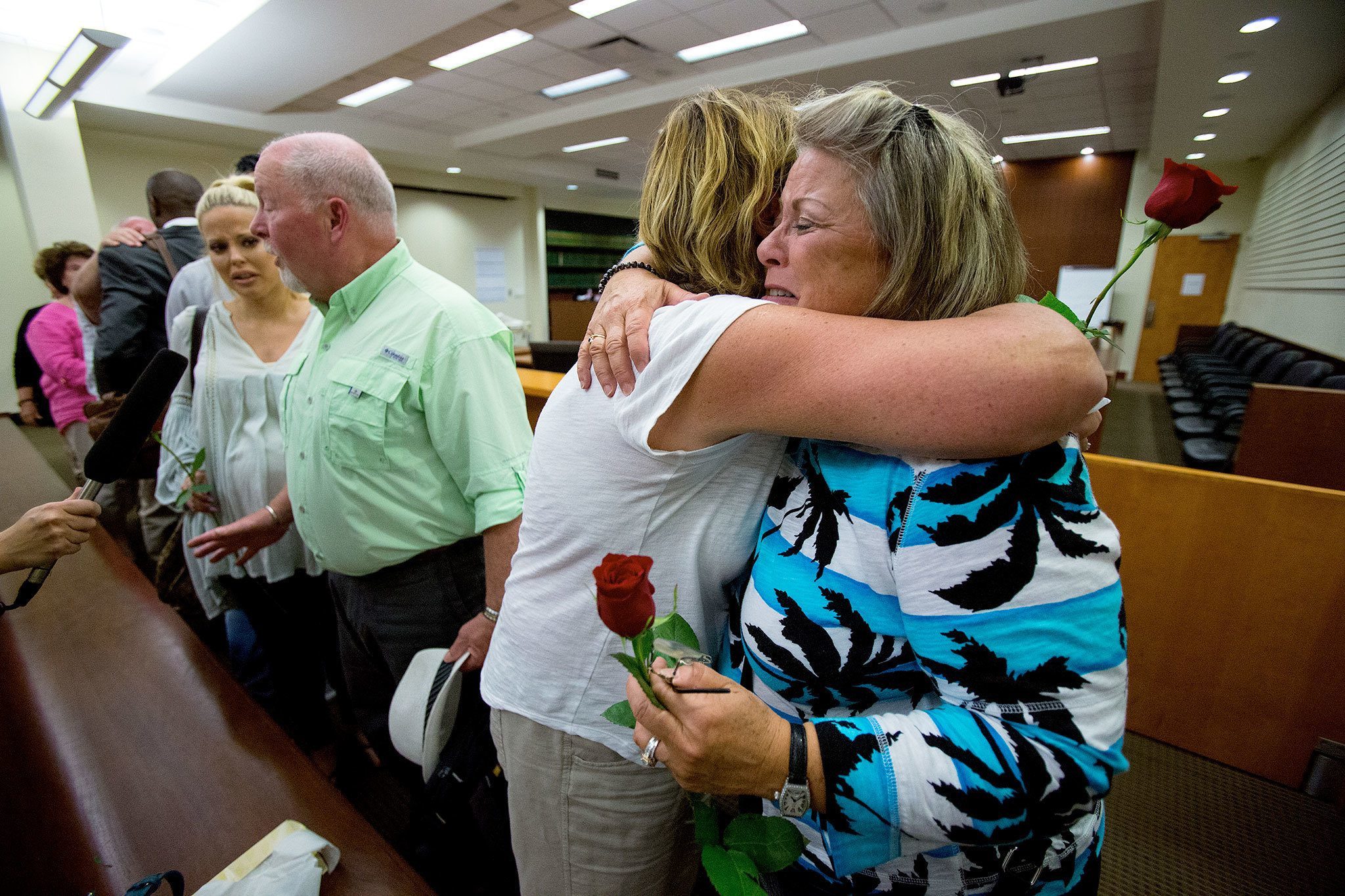EVERETT — The small white rose pendant Julie Mohr was given more than a decade ago after first meeting Rachel Burkheimer’s family trembled in her hands as she waited for the jury’s verdict Thursday.
It was the second time the deputy prosecutor had asked a Snohomish County jury to convict John Alan Whitaker of murder. It was the fourth time she asked Burkheimer’s family to put their faith in the legal system since the girl was killed in 2002.
“We’re just happy that Rachel got justice today,” Mohr said later, standing next to Snohomish County deputy prosecutor Edirin Okoloko, who tried the case with her.
After a series of bizarre twists the day before, a jury on Thursday convicted Whitaker of aggravated murder and conspiracy to commit first-degree murder after six hours of deliberations. He faces a mandatory life sentence.
Whitaker was serving life behind bars before the state Court of Appeals overturned his conviction in 2013. The appellate court ruled that Whitaker’s 2004 aggravated murder conviction was flawed because the courtroom had been closed for a few minutes while prospective jurors were questioned about their fitness to hear the evidence.
“It was unbelievable when we were told there was going to be another trial,” Burkheimer’s mom Denise Webber said. “It has dredged everything up. I heard things this time I never heard before, but if (Rachel) experienced it, I felt like I had to listen to it, as her mom.”
She and her family already had endured trials for two other defendants, Whitaker’s first trial and dozens of hearings for several other young men who pleaded guilty for their roles in the killing and kidnapping.
Burkheimer’s family was relieved Thursday. Although, they know the case isn’t over for them. Snohomish County Superior Court Judge Linda Krese has yet to rule on the defense’s motion seeking a mistrial. Krese scheduled the hearing for later this month. She also scheduled a sentencing date for Whitaker, 35.
The defense team argued before deliberations that the jurors shouldn’t have heard evidence that Whitaker invoked his right to remain silent in 2002 when he declined to speak with Snohomish County sheriff’s detective Brad Pince.
“If we have to come back, we’re ready,” Bill Burkheimer said. “Rachel’s army is ready.”
His daughter was killed Sept. 23, 2002 by young men who claimed to be her friends. They suspected Burkheimer of setting them up for robbery by a rival band of low-level thugs.
Burkheimer was tied up and held hostage in a south Everett duplex for hours. She was beaten and taunted. Witnesses testified that she vigorously nodded her head when someone asked if her parents would pay money to get her back. Eventually, the group stuffed her into a duffle bag and drove her out to the Cascade foothills.
Whitaker was accused of helping dig a grave, where Burkheimer was forced to kneel. He took her clothes and her jewelry. Her ex-boyfriend, John “Diggy” Anderson, shot her multiple times in the head and chest. The group attempted to cover up the crime, destroying evidence and tossing the gun.
Whitaker’s attorneys didn’t try to persuade jurors that their client’s hands were entirely clean, but they argued that prosecutors failed to prove the aggravating circumstances. Defense attorney Cooper Offenbecher repeatedly insisted in closing arguments that Whitaker wasn’t a major player in the acts that caused Burkheimer’s death and therefore not guilty of aggravated murder.
Without the aggravating factors Whitaker could have escaped the mandatory life sentence.
“We’re very disappointed with the verdict,” Offenbecher said.
There was no telling what to expect Thursday morning when the law clerk unlocked the second-floor courtroom and lawyers, Burkeimer’s and Whitaker’s families and the public filed in. The day before some jurors were in tears, and the presiding juror claimed threats had been made during the closed-door deliberations. She sent out a note saying some of what was happening in the jury room was “unbelievable.”
The reported threats prompted prosecutors to ask that the gun and ammunition admitted as evidence in the case be stored away from jurors. Then later that afternoon, one juror, who for a time had declined to be in the same room as the rest of the group on Tuesday, was carried out of the courthouse on a stretcher. He complained of chest pains and feared a heart attack.
At one point the defendant’s attorneys called for a mistrial because the man had been separated from the other jurors during deliberations. They later withdrew their motion, insistent that the sick juror — whom they called a “defense hold out” — be given a chance to recover. The man had told court staff the rest of the jury was ganging up on him. He reportedly said he was worried that the defendant wouldn’t get a fair trial.
Prosecutors also had advocated for a mistrial, citing the unknown threats. They, too, reversed their position.
Spectators and lawyers left the courtroom Wednesday, shaking their heads and wondering where the case against Whitaker could go from there.
Krese came out on the bench Thursday morning and promptly excused the ill juror. She had received word that he remained hospitalized. His wife didn’t know when he’d be released, Krese said. Over the defense’s objections, the judge seated an alternate juror. The man had heard all the testimony right along with the rest of the group. Jurors were told to disregard their previous deliberations through Wednesday.
“You must start over,” Krese said.
Some jurors appeared relieved, smiling and nodding as the judge instructed them to again begin work on the case. The first witness in the trial, Burkheimer’s dad, had testified nearly three weeks ago.
“In spite of the wild ride, the 17 days in a blender, we came right side up and justice was served,” Bill Burkheimer said.
Diana Hefley: 425-339-3463, hefley@heraldnet.com. Twitter: @dianahefley
Talk to us
> Give us your news tips.
> Send us a letter to the editor.
> More Herald contact information.

























